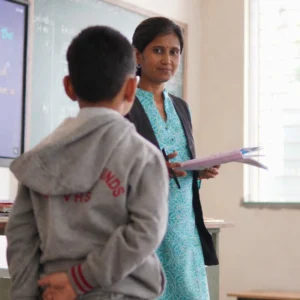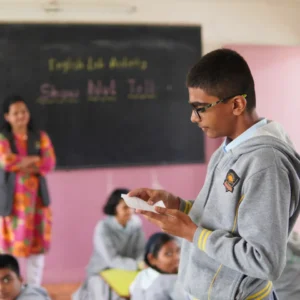As Vidyanchal School continues its mission of holistic education, a new cohort of learners—Generation Alpha (born roughly 2010–2024)—is reshaping classrooms with unique traits, values, and expectations. Both educators and parents will benefit from a deeper understanding of what sets these learners apart and how VHS can continue evolving to meet their needs.
1. True Digital Natives with an Appetite for Multimedia
Gen Alpha learners are the first who have known only a digital world. By age 11, 94% own a smartphone, 80% use virtual assistants, and 68% watch YouTube daily. According to another report, 65% of children prefer learning via virtual or augmented reality, and more than half have used AI‑powered learning tools such as chatbots or interactive quizzes.
This means Gen Alpha thrives on multimedia, animation, bite-size video, and interactive apps—not long lectures or dense textbooks. As one source notes, they learn best through visual, video-led, short-format modules, and expect instant feedback. Teachers at VHS are already incorporating smart boards, animated simulations, and multimedia projects to match these preferences.
2. Independent, Self-Driven Learners Who Take Initiative
Gen Alpha displays high autonomy: many explore interests through platforms like YouTube or Duolingo, learn coding basics independently, or launch creative media projects even before secondary school. Reports cite that 62% of Alpha children use AI tools for learning and 75% engage in coding or programming activities. They’re comfortable juggling platforms, multitasking, and seeking information unaided.
At VHS, lesson plans now include inquiry-based learning, passion projects, and opportunities for independent exploration. Whether in robotics, eco-craft, or writing, students are encouraged to initiate, investigate, and innovate at their own pace.
3. Socially Conscious, Emotionally Savvy & Collaborative
Gen Alpha is highly aware of mental health, diversity, and global issues. One study found 59% believe mental health should be prioritized in schools, and one in four adolescents meet criteria for serious mental illness—making emotional support essential from the start. They also place high value on inclusivity, with many expressing strong environmental and equity concerns
Vidyanchal’s curriculum already integrates social-emotional learning (SEL), empathy-building activities, environmental awareness projects, and peer support systems. This resonates deeply with Alpha learners, who expect schools to support their emotional well-being and ethical growth.
4. Shorter Attention Spans, High Expectations for Engagement
Raised on fast-delivery devices, Gen Alpha has developed shorter attention spans and a craving for engagement. A typical 12–15-year-old Alpha might consume multiple streams—apps, videos, chats—simultaneously. They are adept at multitasking but may lose interest quickly if lessons lag.
VHS adapts by breaking lessons into bite-sized learning units, alternating between activities—discussion, short video, physical movement, peer reflection. Frequent transitions and hands-on tasks keep learners alert and involved.
5. Giant Focus on Financial Skills and Real‑World Preparedness
Gen Alpha doesn’t just ask to code—they want to understand real-world tools. A recent study found 84% of six- to 18‑year‑olds want practical financial education like budgeting and taxes in schools. Meanwhile, 65% of parents emphasize creativity, storytelling, and problem-solving as key preparation tools for their children’s future careers—more so than traditional academics alone.
VHS blends academic subjects with life-skill workshops, personal finance modules, entrepreneurial projects, ethical tech use training, and exposure to simple budgeting, design thinking, and innovation labs—giving students context, relevance, and purpose.
6. AI-Savvy but Cautious: Embracing with Awareness
Gen Alpha is growing up surrounded by AI—from using ChatGPT for homework to voice assistants at home. Roughly 65% of older Alphas are already engaging with AI tools or intend to soon. A recent Guardian feature highlights how many parents teach responsible AI use, emphasizing creativity and critical thinking rather than shortcuts.
At VHS, educators discuss AI openly—how and when to use it, how to triangulate sources, and how to retain curiosity and deeper understanding. We pair AI-enabled learning modules with reflection and human-led mentorship, nurturing both tech fluency and mindful application.
Why These Traits Matter for Teachers and Parents
Gen Alpha is not like earlier cohorts. They expect immediacy, autonomy, and contextual relevance from their education. Educators at VHS are adapting by:
- Designing lessons with multimedia, interactive simulations, and video-based prompts.
- Offering personalized learning paths, where students choose mini-projects that align with interests.
- Supporting mental health education, mindfulness, peer empathy workshops, and community service.
- Structuring lessons to switch modes frequently—short segments, movement, collaboration, reflection.
- Introducing life-skills training, financial literacy, coding/play projects, and entrepreneurial routines.
- Integrating AI tools with critical thinking tasks, ensuring students reflect on AI output rather than blindly trusting it.
For parents, understanding Gen Alpha means valuing what your child already expects—and guiding them toward balance. Encourage reading, project creation, arts engagement, healthy screen habits, and responsible AI use. Maintain open conversation about what they consume, produce, and create online.
In Summary: Gen Alpha Learners Are Passive No More
Generation Alpha represents a leap in learner autonomy, digital fluency, ethical awareness, and demand for relevance. They aren’t passive receivers—they are curious explorers, tech‑savvy creators, and emotionally intuitive individuals who expect education to reflect their world.
Vidyanchal High School is already evolving to meet these expectations—through multimedia learning, leadership development, consensus-based mental health approaches, real-world skill training, and mindful tech integration.
As one expert reflected: Gen Alpha “learns via immediate feedback, interactive content, and multimodal environments”—not in static, large-group lectures.
For both educators and parents, knowing Gen Alpha means centering education around choice, creativity, collaboration, and context—ensuring that our learners emerge not just academically capable, but future-ready, emotionally resilient, and ready to lead in an ever-changing world.














